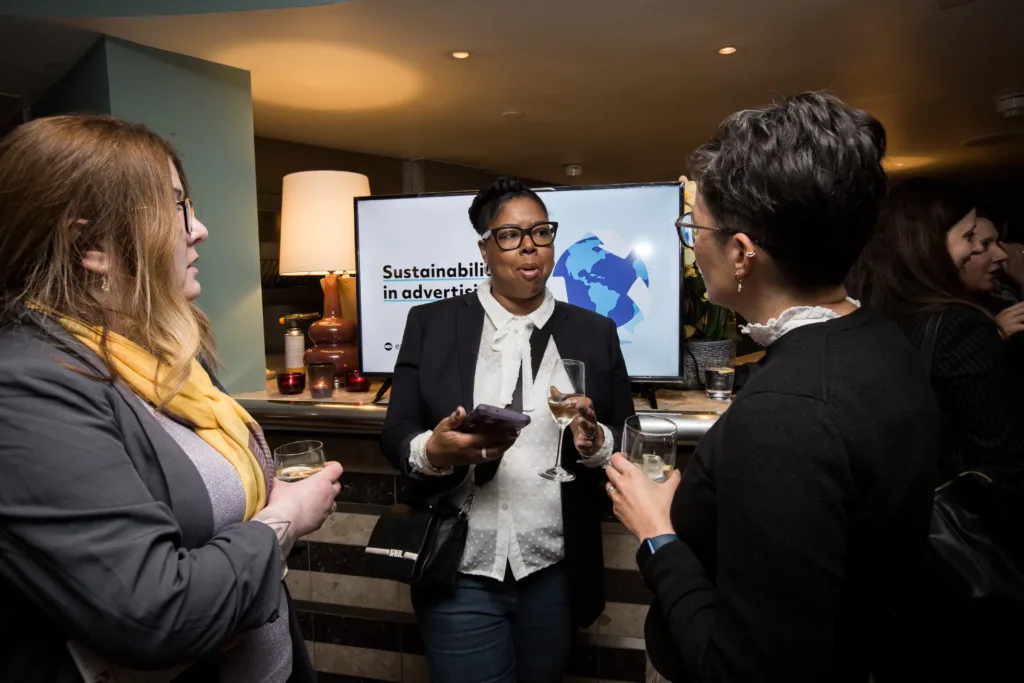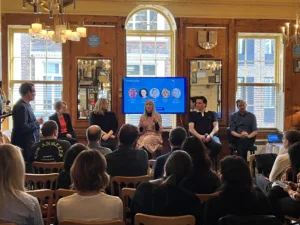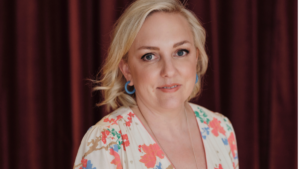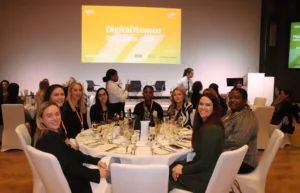In May 2023, New Digital Age, in partnership with Eyeo, brought together a group of esteemed female digital media, marketing and advertising leaders under the banner of its Digital Women initiative, to discuss one of the hottest topics in the industry: sustainability.
Why is now such a pertinent moment, particularly since sustainability has been on the agenda for some time? Quite simply, clients demand it. Fiona Salmon of Captify reveals that she had “seen a massive increase in request for information (RFI) questions”. It’s no surprise that interest is peaking – as she also admits, “digital advertising is built on an ecosystem that is really carbon heavy.”
“Brands are so aware of social issues that they’ll drop someone like hot cakes if it’s the right thing to do,” agrees Rachel Wilkinson, associate director at Xaxis. Pointing to the Adidas Yeezy debacle as well as the overall awareness of issues like net zero, “if you want to be a top tier agency, you’ve got to be ahead of the conversation.”
While attendees recognise the environmental and societal imperative to embed sustainability into the digital media ecosystem, it is also a trust issue. Jules Kendrick, MD, UK and Europe for TAG, says: “We all know we have a huge issue with consumer trust in advertising. Obviously, we want to leave a better world for our children but if we don’t address sustainability that’s going to be an issue for us in rebuilding trust with consumers.”
It was also recognised that it is hard to get the balance right when the consumers themselves are highly contradictory when it comes to walking the talk. In particular, noting that younger generations’ heavy dependence on digital is at odds with a demand for reduced carbon footprints. Despite appearances to the contrary, it is very much not the ‘carbon lite’ alternative to traditional media.
“For young people, when it comes to sustainability, they get the theory but if they understood the practice, perhaps they wouldn’t be behaving in the same way as they are – knowing the hidden costs of what it means to be on your phone 24/7, for example,” warns Mumsnet’s Julia Reip.

“Advertising a fantastic medium to change the way we as a society think and behave. And we have had a bad rap,” suggests Emma Newman, CRO, EMEA at Pubmatic. “But if you think about the power of advertising and what it can do for good – most people wear a seatbelt and don’t smoke. But, we cannot preach to others if we are not prepared to sort out our own house.”
Xaxis’ Wilkinson explains how some agencies are trying to ‘work better’: “We’re looking at how you can fund the people doing the good work because, we’re in advertising, we’re not experts in everything.” She advises exploring and measuring how the leaders are making a difference and using that to guide not just themselves as an agency but also their clients.
“We have been part of the problem, and we now have to be part of the solution,” states Kate Waters, Director of Client Strategy and Planning at ITV. “It requires time, effort and ultimately, perhaps, regulation. We have a huge opportunity to influence suppliers, customers and our viewers; all of which can help to create the right culture and environment for change. It’s a battle we need to fight on multiple fronts.”
Chloe Grutchfield, general manager, publishers at Permutive sees a potential workable parallel with GDPR, and that sustainability will see a similar approach to privacy impact assessments. Instead of data, it focuses on things like image resolution, redirects and volumes of data being shared across servers. “That’s the point at which we make a real change because the people building things will need to check ‘have I done the sustainability impact report?’.”
PHD’s regional digital director, Emma Jensen, does have a pertinent question about regulation: “Why would you wait?”. Again, picking up on the idea of a parallel with GDPR, regulation has been a benefit but she noted that “so many publishers and partners we work with waited til the last minute instead of being at the forefront. Regulation will absolutely propel us forward, but I also don’t want us to become complacent and wait for those regulations to happen before anything changes.”
In part two of NDA’s Digital Women Sustainability in Digital Advertising summit we explore the potential for regulation to shape and standardise sustainability efforts, and how to measure and communicate success.









